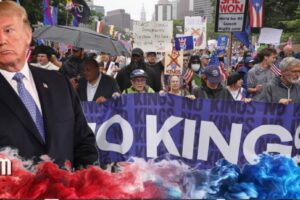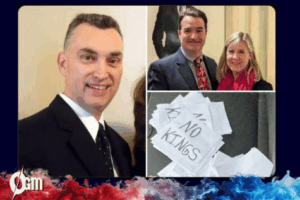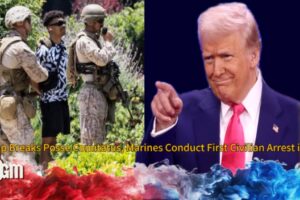President Joe Biden’s recent announcement that Cuba will be removed from the U.S. list of state sponsors of terrorism has sent shockwaves through MAGA supporters, who are furious over the decision. This long-overdue shift in U.S. policy marks a significant departure from previous administrations, which had kept Cuba on the list as a means of exerting economic pressure. The move is seen by many as a step toward more diplomatic engagement with the island nation, though it has sparked outrage among conservatives who view Cuba’s government as an ideological enemy.
President Joe Biden’s decision came after a comprehensive assessment by the administration, which found no substantial evidence linking Cuba to terrorism. For years, Cuba’s designation as a state sponsor of terrorism was a politically charged issue, with critics arguing that it was an unjust label that contributed to the island’s ongoing isolation. Despite the justification for this policy shift, many MAGA followers are vehemently opposed to what they view as a concession to a regime they have long criticized.
The U.S. Removes Cuba from the Terror List: An Analysis
President Joe Biden’s decision to remove Cuba from the U.S. list of state sponsors of terrorism signals a major change in American foreign policy. For decades, Cuba had been grouped with countries like North Korea, Iran, and Syria, whose governments have been linked to acts of terrorism. However, senior administration officials made it clear that there is no credible evidence to support Cuba’s continued designation on this list. This assessment represents a broader shift in U.S.-Cuba relations, moving away from punitive economic measures toward engagement and dialogue.
The decision has been welcomed by some, but not without controversy. Critics from the Cuban-American community, particularly in Florida, argue that lifting the designation could lead to more leniency toward the Cuban government. Despite these concerns, the Joe Biden administration maintains that the decision is grounded in evidence and is consistent with broader humanitarian goals, including supporting the release of political prisoners on the island.
A Strategic Move with Global Implications
Joe Biden’s policy shift regarding Cuba is not only a significant change in U.S. policy, but it also carries major implications for the wider Latin American region. The move is widely viewed as a response to growing calls from international allies, including the European Union, Spain, Canada, and several Latin American countries, to remove Cuba from the list. With Cuba’s designation being increasingly seen as outdated and politically motivated, President Joe Biden’s decision aligns with the broader diplomatic efforts to foster more positive relations between the U.S. and its regional neighbors.
The Joe Biden administration sees this moment as an opportunity to reset U.S.-Cuba relations, particularly in light of ongoing discussions with the Catholic Church regarding the release of political prisoners. This diplomatic opening has the potential to reshape U.S. relations not only with Cuba but also with key allies in Latin America who have long opposed the terrorism designation. By taking these steps, President Joe Biden aims to promote stability and dialogue in a region where U.S. influence has historically been a source of tension.
Catholic Church’s Role in Cuba’s Political Prisoner Release
President Joe Joe Biden’s decision to remove Cuba from the U.S. list of state sponsors of terrorism is intricately tied to the role the Catholic Church has played in facilitating dialogue between the U.S. and Cuba. Senior administration officials have highlighted the church’s significant efforts in advancing an agreement aimed at securing the release of political prisoners on the island. This agreement is seen as a major breakthrough, as it addresses one of the most contentious issues in U.S.-Cuba relations: human rights.
The involvement of the Catholic Church has provided a unique opportunity for the U.S. to engage with Cuba in a way that prioritizes diplomacy over confrontation. By supporting the church’s efforts, President Joe Biden is signaling a shift towards more constructive engagement with Cuba, focusing on humanitarian issues like the release of unjustly detained individuals. This move reflects a broader trend in U.S. foreign policy, where diplomatic dialogue is prioritized over punitive actions, with the goal of achieving positive outcomes for both nations.
Regional and International Reactions to Biden’s Cuba Policy
President Joe Joe Biden’s decision to remove Cuba from the terrorism list is expected to be met with positive reactions both regionally and internationally. Countries in Latin America, as well as European allies, have long called for Cuba to be removed from the list, recognizing that its continued designation was increasingly seen as an obstacle to meaningful engagement. Senior administration officials have expressed confidence that the policy shift will be broadly welcomed, not just by Cuba, but by many nations in the region and around the world who view the U.S. decision as a step toward greater diplomacy.
The move is also expected to improve the United States’ standing in Latin America, where there has been long-standing criticism of U.S. policies that isolate Cuba. By removing Cuba from the terrorism list, President Joe Biden has made a clear statement about the need to move beyond Cold War-era antagonisms and toward a more constructive relationship with the island. The shift is seen as a victory for global diplomacy and a signal that the U.S. is willing to engage with nations based on current realities, rather than outdated labels.
Should Donald Trump Keep President Joe Biden’s Policy to Ensure Global Stability?
The question of whether former President Donald Trump should keep Joe Biden’s policy of removing Cuba from the terrorism list is a subject of significant debate. Supporters of the move argue that maintaining this policy could contribute to a more peaceful and stable world, particularly by fostering diplomatic engagement and reducing the potential for conflict. By keeping Cuba off the list, Trump would signal a commitment to constructive dialogue, which could pave the way for greater cooperation in the future.
Critics of Trump’s potential involvement in continuing President Joe Biden’s policy shift suggest that his traditional hardline approach to foreign policy may hinder any long-term progress. While Trump’s previous policies emphasized sanctions and isolation, Biden’s approach reflects a growing global consensus that engagement and diplomacy are essential for addressing complex international issues. Maintaining this shift would not only support global peace efforts but could also set a new precedent for U.S. foreign policy in the region. Ultimately, the future of U.S.-Cuba relations will hinge on how subsequent administrations choose to navigate the balance between diplomacy and national security interests.














